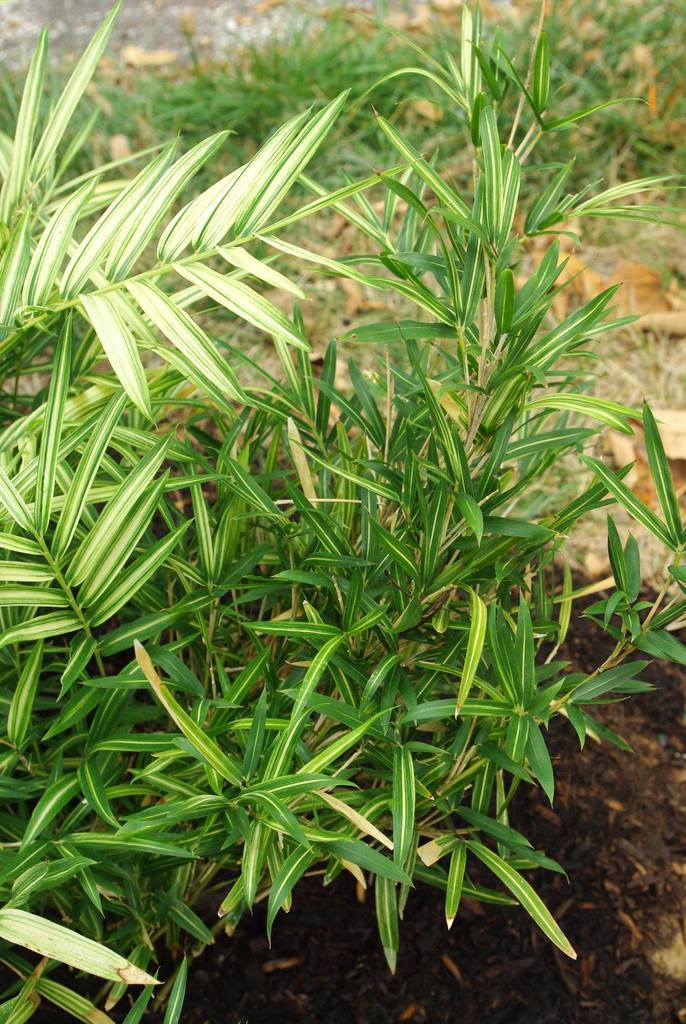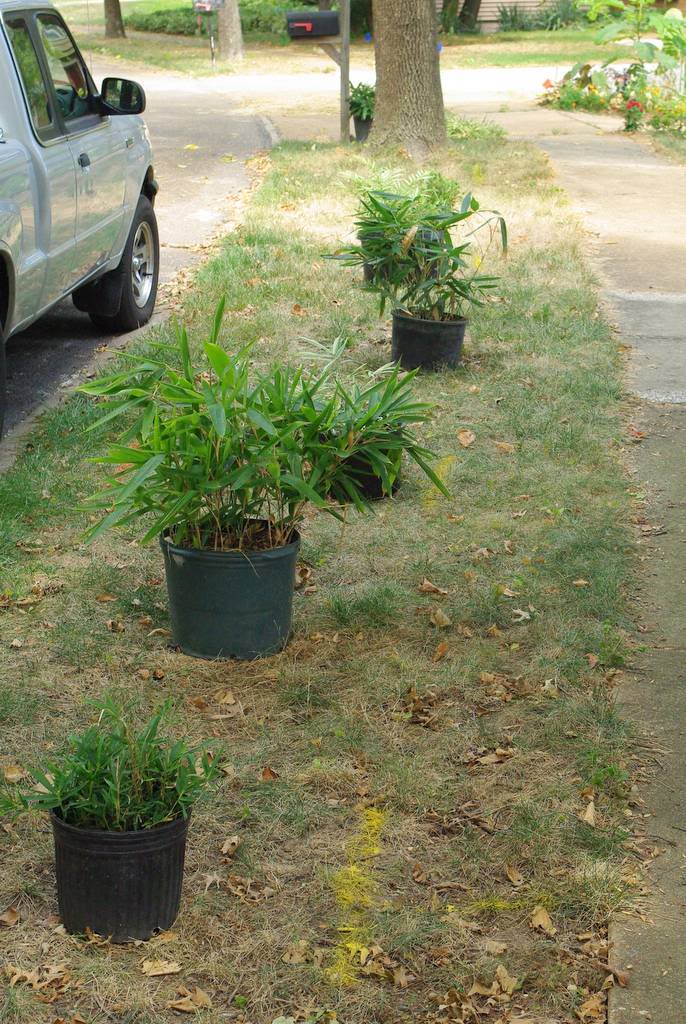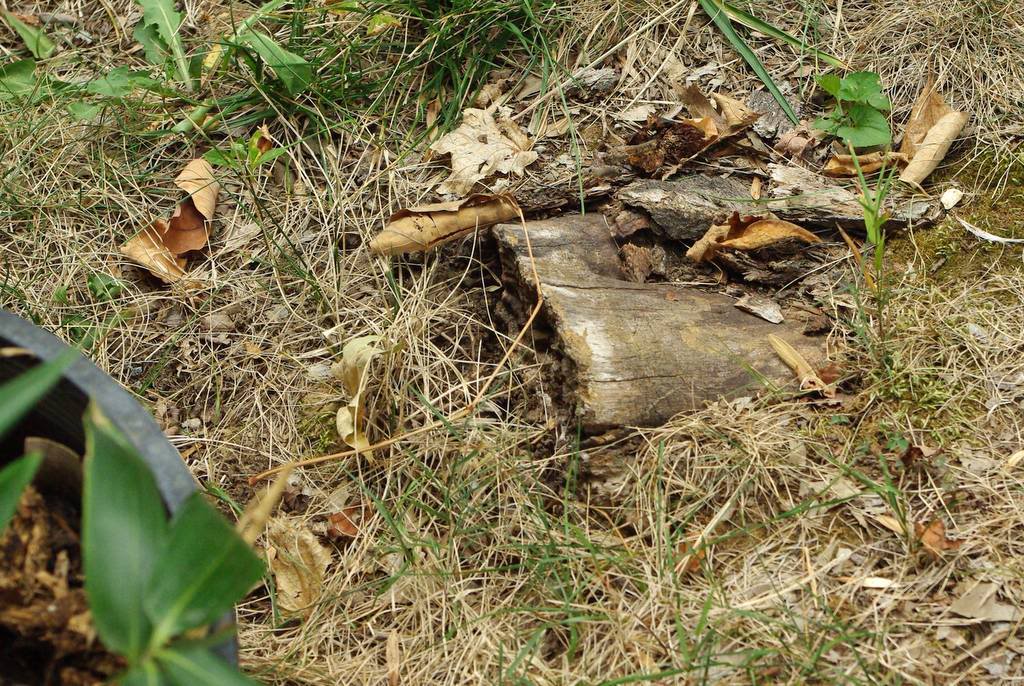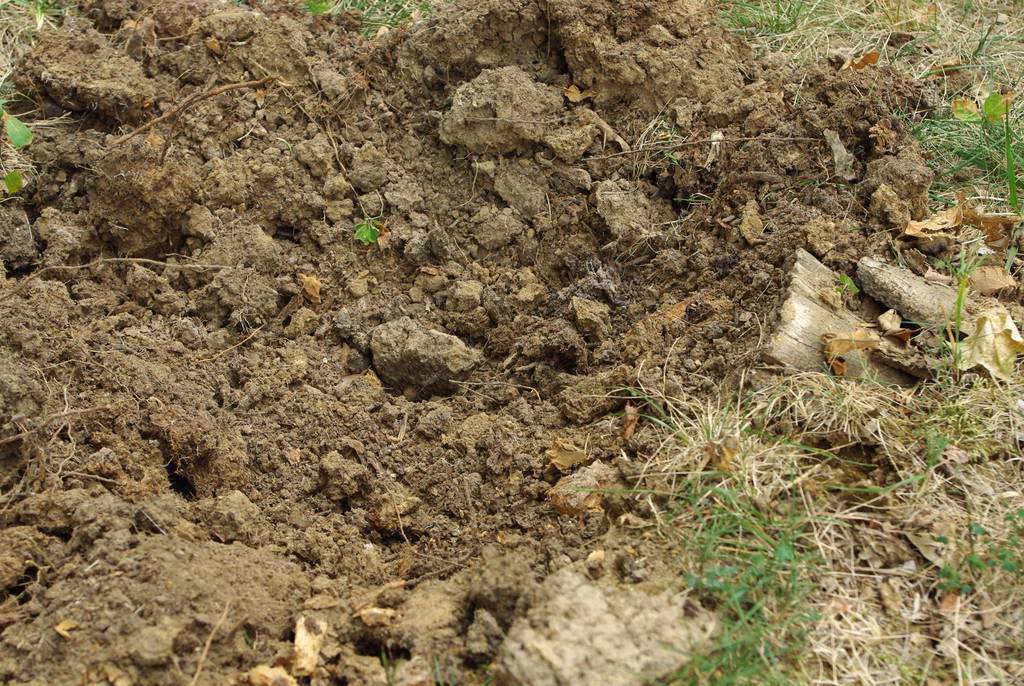As you can see, there's nothing too exciting happening in a large part of the front yard. Focus on the strip of lawn in the foreground of this photo -- the area between the sidewalk and the street. Nothing but 40-year-old lawn here, but that's soon to change.
If you remember, this strip is not my property, and since there is a utility easement here it can be dug up at any time.
This is one reason that most people don't plant anything here.
See the painted lines on the grass in the photos above?
Yellow is the gas line, while orange is cable TV (the reason for the recent excavation work).
Despite the risk of having my plants carelessly excavated some day, I've decided to take a chance and do some planting. I need plants that will spread quickly to fill in this area, are tough enough to handle less-than-ideal soil, can take some road salt in winter, and will look great for most of the year.
I know just the plant for this: bamboo!
I have several different varieties in pots that don't get more than a few feet tall (or can be mowed/pruned to keep them under this height) that I've been wanting to get into the ground for a while, so I've been considering this plan for the last year or so. Time to stop planning and start planting!
I did have to dig one variety (Sasa veitchii), as I didn't have it in pots yet. A lot of roots broke off in the ultra-dry soil as the rootball kept cracking apart, so I expect this plant to look quite ragged in a week or so. Fingers crossed that at least part of it survives.
The soil here is about as bad as any I've seen. Pretty much straight clay that's bone dry and rock hard:
I was only able to dig down 4-6" (10-15cm) because of the hardness and presence of tree roots, but that's enough for what I'm doing.
I added lots of compost and manure, and got planting. I then mulched a ring around each plant with a thick layer of the same compost/manure mix. The soil underneath should begin softening and loosening over the next several months, and I'll expand the ring a bit each year as the bamboo spreads.
As usually happens to me, there's an obstacle keeping me from putting one of the plants exactly where I want it:
This is one of the big roots left from a tree that was removed about six years ago. I thought it would have rotted enough by now for me to pry it out, but it wasn't budging.
So I moved the plant over a bit and will let it spread into the area I wanted it in originally. Oh, I could have gotten out the axe and chopped out enough of that root to plant where I wanted, but I'm no longer keen on making extra work for myself -- digging these seven holes was work enough.
With all of the plants in, the "hell strip" (as this patch of ground is called in gardening circles) was transformed!
I'm amazed at what a difference having these plants out there makes, even when they're still quite small like this.
 |
| Pleioblastus fortunei and Indocalamus longiauritus |
I ordered the plants carefully, making sure that adjacent plants had drastically different textures and colors. The thin variegated leaves of Pleioblastus shibuyanus 'Tsuboi' for instance go next to the large leaves of Sasaella bitchuensis:
 |
| Pleioblastus shibuyanus 'Tsuboi' |
Similarly, variegated Pleioblastus fortunei goes between the bitchuensis and Indocalamus longiauritus:
 |
| Indocalamus longiauritus |
The tiny but aggressive Pleioblastus distichus is in there too:
For the bamboo curious, here's a list of all the species I planted, starting with the foreground plant and going away from the camera:
The bamboos I planted:
- Sasa veitchii
- Pleioblastus distichus
- Pleioblastus shibuyanus 'Tsuboi'
- Sasaella bitchuensis
- Pleioblastus fortunei
- Indocalamus longiauritus
- Pleioblastus fortunei (green seedling)
They will take a few years to start filling in, but eventually I'll remove all of the grass from this strip and it will be 100% bamboo. I'll need to rhizome prune between the plants to keep them from mixing, but that will be easy work and well worth the effort.
I'm excited about this, and in a couple of years I'll be looking back at this post and thinking "look how small those bamboos were!"
Now I'm eager to get moving on the rest of this project. Maybe I'll start phase 2 next weekend...
.
















What a project - nice contrasts of foliage. Looking forward to the next step.
ReplyDeletePerfect use for bamboo. I think it'll look fantastic! Keep us posted...
ReplyDeleteRe Pleioblastus shibuyanus 'Tsuboi'. Did yours ever flower? Mine is STILL flowering, what little is left of it.
Tsuboi: I got this division in March, and it didn't flower this year. Was that because of it just being dug? I don't know. The parent plant has been flowering for a while, but looked quite healthy.
ReplyDeleteI don't think you'll regret this at all Alan! Why not let them mix? Are you worried about some dominating others?
ReplyDelete-jeremy
Jeremy: mixing would be a mess, and yes, some would start dominating for sure. I'm only planning on having a narrow strip cut between each species so their leaves will still touch. I just don't want the rhizomes mixing.
ReplyDeleteEven the small bamboos look better than what was there. I think bamboos are a perfect choice here and it will look stunning sooner than you expect.
ReplyDelete